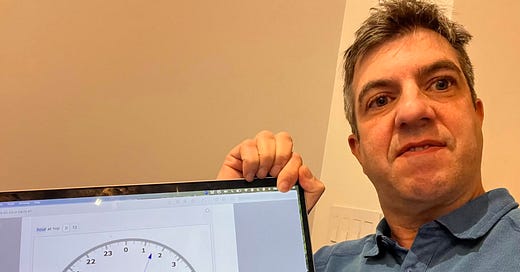I still love America despite the many struggles and crises we are going through. But in 2025, I’ve done something that might be considered un-American: I’ve switched to a 24-hour clock.
I changed my iPhone to say 18:05 instead of 6:05 p.m.
I asked Julie if we’d be eating dinner before 19 o’clock (she’s not a fan; more on that in a moment).
While taking my morning shower, I like to sing Dolly Parton’s classic “Working 9 to 17, what a way to make a living!”
Well, that last one isn’t true.
But what is true is that I made the switch to what Americans call “Military Time,” but what should probably be called “Perfectly Sensible-and-Not-Based-on-17th-Century-Technology Time,” or “What-Most-Countries-on-Planet-Earth-Use Time.”
Making the leap to 24-hour clock — a system used by all but a handful of former British colonies — has its challenges. The transition has been a bit bumpy, like trying to learn Farsi. I’m still not fluent.
But, I believe the advantages of switching from the 12-hour to 24-hour clock outweigh the challenges. Among them:
—The lack of ambiguity. I will never again be woken at 3 in the morning by my iPhone alarm that I mistakenly set for 3 a.m. when I meant to set it for an afternoon nap.
—A 24-hour clock gives me more of a birds-eye view of my day. I now visualize my day as a pie with 24 slices, which helps me when I’m allocating chunks of time to various projects.
—I get a slight sense of smugness that I might be ahead of the curve — that in 20 years, most Americans will have made the switch.
I decided to take the plunge after a conversation with my son Jasper. He said he finds it fascinating that America hasn’t switched to 24-hour time and wondered if it was because we are too lazy to subtract the number 12.
I decided I was up to the task of subtracting 12. Or at least I should try.
Next, I researched where our strange 12-hour system came from. It seems that it’s a hangover from old technology, such as bell-ringing and analog clock faces. Our ancestors found it tiring to ring 24 chimes or look at 24 roman numerals. Neither of which is a pressing problem today.
According to some sources, Canada’s railroad system was a pioneer that made the change in the late 1800s. Most of the world has switched in the ensuing decades. But not the US. Or at least not totally. The United States has begrudgingly adopted Military Time in certain industries where mix-ups could be costly — medicine, air travel, and trucking, for instance. But we still lag behind most countries. Even the UK is ahead of us. When I wanted to change my Gmail to 24-hour time, I had to switch my preferences to the UK interface.
Julie said I could do whatever I wanted on my email and iPhone, but she would prefer I speak to her using 12-hour time, at least until my movement succeeds in convincing the rest of America.
Which brings up the question: What is the best way to say 24-hour time out loud? I considered speaking like a Green Beret and saying things like, “Oh-nine-hundred” or “Fourteen hundred.” But it was a little too martial for me.
So I just say to friends, “I’ll meet you at 14 o’clock,” or “I’ll meet you at 14.” That seems to be what civilians in most other countries do.
Am I at the forefront of a movement? Or am I like those well-meaning but annoyingly deluded people who learn Esperanto because, obviously, we’ll all be ordering kafo at the restoracio soon? Hard to say.
On the one hand, a 24-hour clock is obviously a better system. The fact that I’ve been following a 12-hour clock all my life has blinded me to just how bizarre it is. But imagine if we did this with temperature. Imagine we split the thermometer so that we had zero to 50 degrees cold, then at 51 degrees, we suddenly started over again, and it became “One degree hot.”
But better systems don’t always catch on. There’s a startup cost. I’ve been doing it for several days, and I still have to double-check my subtracting skills. Whether the US switches partly depends on whether the 12-hour clock is an economic problem or just an annoyance. I searched the Internet for a study that said it cost the US economy billions because of inefficiency and confusion. I couldn’t find such a study. I also looked for historical examples of clock-caused disasters, such as a D-Day ship that showed up 12 hours late. They’re hard to come by, too.
Despite the lack of studies, I’m guessing our stubborn love of 12-hour time does cause some amount of inefficiency and confusion. But will that be enough to nudge America to change? I mean, the metric system is obviously better, but even I am not willing to go the extra kilometer and start using that.
Well, that’s all for today. I’m going to knock off and have a cocktail, since it’s 17 somewhere.






NIceee!
Be a pioneer on the metric system as well, please
I'm with you!!